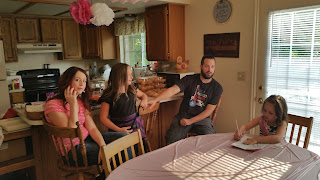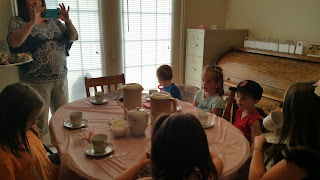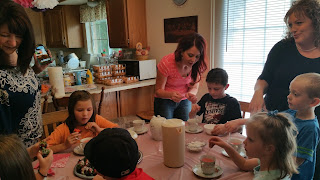 |
| Ellie birthday morning |
 |
| waiting for the guests |
 |
| Maren, Brinlie, Landon, Ellie |
 |
| Starting the "tea" party |
 |
| Shirley Gentile, Kallise, Maren, Guage, Heather, Ryker, Taylor, |
For Sacrament they talked about having moral values in a
world moving away from those values and how they can bring you to Christ. They all gave good talks but Diane Standing
talked about how Keeping the Sabbath day Holy can bring you closer to Christ
and his values. It was such a good talk that I ask her for a copy of it.
Moral Courage through Christ in a Divided World
President Monson has said, "We live in a world where moral values have in great measure, been tossed aside, where sin is flagrantly on display, and where temptations to stray from the straight and narrow path surround us. We are faced with persistent pressures and insidious influences tearing down what is decent and attempting to substitute the shallow philosophies and practices of a secular society.
Because of these and other challenges, decisions are constantly before us which can determine our destiny. In order for us to make the correct decisions, courage is needed--the courage to say no when we should, the courage to say yes when that is appropriate, the courage to do the right thing because it is right."
The word courage is defined as "mental or moral strength to ...persevere, and withstand danger, fear, or difficulty."
The quiet, inner tests of courage we may face are things like remaining faithful when no one's looking...like standing alone when you're misunderstood., doing the right thing even though we may be afraid, defending our beliefs at the risk of being ridiculed, and maintaining those beliefs even when threatened with a loss of friends or of social status, of being disapproved and unpopular.
While speaking at Family Conference, President Uchtodorf pointed out that "We need only to open a newspaper to realize that we are living in a cynical time. Trust in public institutions corporations, and organized religion is declining. Almost daily, media reports describe the decline of moral decency and the erosion of basic ethical conduct.
In this time of uncertainty, mistrust, fears, rumors of war, and political road rage, is there still hope of integration and openness across different cultures, different religions, societies, and political interests? Is there still hope for virtue, moderation, and divine moral principles?
I believe one reason for today's decline in moral values is that the world has invented a new, constantly changing, undependable standard of moral conduct often referred to as "situational ethics" Some consider good and evil adjustable according to their own situation and interest. They wrongly believe that there is no divine law and, therefore, no sin."
Elder Alexander B. Morrison notes that in spite of clear expositions given on the brotherhood of man and the fatherhood of God, deep divisions of race, ethnicity, politics, economic status, and culture still separate people the world over. These divisions corrode, corrupt and destroy relationships between neighbors and prevent the establishment of societies without contention.
Even 40 years ago Elder Mark E. Petersen boldly pointed out society trifling with the Lord's commands: He says, "It is no trivial thing to reject Almighty God, either by show of indifference or with malice aforethought. The divine words still echo in our ears: "Trifle not with sacred things"(D&C 6:12)
His commandments are clearly set forth. His standards of morality, honesty, and the other virtues are well known. But sadly enough they are noted more for their rejection than for their acceptance. Does this mean that desolation might come upon us in some form?
Why should legislatures condone immorality, whether homesexual or otherwise?
Why should officers of state condone vice and even protect it? Why should lawmakers--why should the courts--oppose prayer and reading of the scriptures, doing so in the name of the constitution of this land, where we daily affirm, "In God is our trust"? Are they for Christ or against him in this Christian land? Can there be be any neutrality with respect to God? Christ says no! We are either for him or against him (see Matt 12:30)
Why should officers of state condone vice and even protect it? Why should lawmakers--why should the courts--oppose prayer and reading of the scriptures, doing so in the name of the constitution of this land, where we daily affirm, "In God is our trust"? Are they for Christ or against him in this Christian land? Can there be be any neutrality with respect to God? Christ says no! We are either for him or against him (see Matt 12:30)
Why should legislatures favor a wholesale violation of the Sabbath day and defeat Sunday closing laws? Why should so-called Christian peoples put up with it?
Almost like children, we fret over our fuel shortages and other inconveniences. We resent restrictions upon our pleasure-seeking activities. Why don't we admit like grown men and wormen that rejection of God is at the very root of all of our troubles? Why do we refuse to wake up to the facts in our situation? Why must we blindly plunge on into catastrophe?
Should we not take right and proper steps to overcome our conflicts, our crimes, and all of our corruptions?"
For Strength of Youth contains the following counsel, approved by the First Presidency for the youth of the Church: "You are responsible of the choices you make. God is mindful of you and will help you make good choices, even if your family and friends use their agency in ways that are not right. Have the moral courage to stand firm in obeying God's will, even if you have to stand alone. As you do this, you set an example for others to follow."
So agreed. Life is full of trials, oppositions, divisions and choices. And we are expected to overcome these and do so courageously.
All well and good. We need to have Moral Courage through Christ in a Divided World. But how? How are we supposed to do this? How are we supposed to build the strength and determination and inspiration to stand against the world? Given any situation posed in Sunday School we know what we should do. The answers are easy. But what happens when we step outside the chapel, outside the classroom, outside the posed situations where does the courage come from?
President Eyring notes that "One of the purposes of mortal life is to prove to God that we will keep his
commandments, especially in moments when that takes courage.
We have great helps to give us courage in this life. The greatest is the atonement of Jesus Christ. We can renew that blessing when we partake of the sacrament in faith and with a repentant heart.
Spiritual gifts are another help. We receive the Spirit of Christ at birth. That gives us the power to know when a choice before us would lead toward eternal life.
God has given us more than enough help to banish fear and give us courage whatever we may face in life."
Ulysses Soares a member of the presidency of the Seventy, further emphasizes the importance of Spirit. He recounts, I recall that each time my companion and I set out to try to prove something to people, the Spirit of God left us and we felt totally lost and confused. We felt that we should more strongly align our testimonies with the truths of the gospel we were teaching. From that time on , I remember that when we bore a testimony with all our hearts, a silent confirming power coming from the Holy Ghost filled the room, and there was no space for confusion or discussion. I learned that no evil forces exist that are capable of confusing, deceiving, or subverting the power of a sincere testimony of a true disciple of Jesus Christ."
So we have the atonement, the Spirit of Christ, and testimony confirmed by the Holy Ghost.
Back again 40 years to Marke E. Peterson's comments: "As we receive baptism, we enter a covenant to serve God. As we partake of the sacrament of the Lord's Supper, we again enter into covenants to serve him, to keep his commandments, and to always remember him.
As we receive baptism, we enter a covenant to serve God. As we partake of the sacrament of the Lord's Supper we again enter into covenants to serve him, to keep his commandments, and to always remember him.
In the sacrament we seal our covenant by partaking of the sacred emblems of the Crucifixion. Literally, then, as we partake, do we not pledge to keep each and every commandment, and do we not confirm that pledge by eating of the broken bread and drinking from the cup?
What does the broken bread represent? The torn flesh of Christ!
What does the cup represent? His blood shed on the cross in the midst of suffering of infinite proportions, suffering which made himself, even God, the greatest of all, to tremble because of pain and to bleed at every pore and suffer both in body and spirit (see D&C 19:18)
The Atonement was the most important thing that has ever happened. It is by virtue of the Atonement that we pledge obedience to our Father in Heaven. We promise not only to live the Gospel in a general way, but specifically to keep the individual commandments.
As we take the broken bread, for example, do we not say to God that by this sacred emblem which we eat, we agree to keep the Sabbath day holy?
Or do we not affirm before heaven that we here and now pledge to pay a full tithing, as another example, and seal our promise by partaking of the sacrament?
Do our covenants have such a specific meaning? I ask you could they mean anything less?"
Recently, in his parting remarks as President of BYU-Idaho, Elder Kim Clark shared "the most important counsel" he could give graduates,
"Keep the world out of your heart and the Holy Ghost in it.
Keeping the world out of one's heart is not easy.
There is all around us now, and there will be all around us in the days ahead, diabolical 'shafts in the whirlwind,' cunning devices, lying craftiness, subtle deception, flattery, doctrines of devils and commandments of men, he said. "These are all designed to tempt you, deceive you, turn you away from Christ, and bring you down to destruction by getting the world into your heart."
The sure way to keep the world out of one's heart and the Holly Spirit in it is through the Sabbath and the sacrament.
If you will observe the Sabbath day to keep it a holy day and if you will partake of the sacrament in a spirit of love, remembrance, and commitment, your faith in our Heavenly Father and in his Son the Lord Jesus Christ, will increase. You will keep the world out of your hearts and the Lord Jesus Christ will bless you with his Spirit."
So the atonement, with the weekly reminding ordinance of the Sacrament, the Spirit of Christ, testimony with the confirmation of the Holy Ghost, and Sabbath day observance will help us build our moral courage.
In the General Authority training on Sabbath Day Observance, the following goals were identified. The Sabbath, specifically Sacrament meeting, is to fortify us spiritually. It is an opportunity to develop deeper understanding of the bread and water. It allows us to participate in an ordinance that is uniquely repeated on our own behalf. It is a day of rest and contemplation., And a day to build family relationships and ties. And this, the Sabbath, is very important, important enough to train the general authorities and then us.
With this emphasis on the Sabbath in mind, it was interesting to me to discover its connection to moral courage.
It all seems to come down to keeping the Sabbath day holy.
When I was given this topic I chuckled to myself. It seemed laced with a bit of irony. I don't identify with the courageous and have recognized the dangers I face of being easily swayed by smooth words, division scares me. I don't like conflict or confrontation, especially when it comes to things dear to me. So challenges to my beliefs, my family, my testimony, my knowledge of what is right and wrong, are not things I enjoy at all, and I really work hard to avoid that. So where is my courage?
The discovery that my Sabbath day worship is bolstering my moral courage in Christ is a deep sweetness. I understand that by partaking of the Sacrament I am acknowledging one of the most important things that has ever happened: the Atonement. And by virtue of the Atonement I pledge obedience to our Father in Heaven and not just to live the Gospel in a general way, but to specifically keep the individual commandments.
How else am I going to do this but through Sacrament attendance. Those keeping the Sabbath day holy are more likely to attend their meetings, thereby partaking of the Sacrament. Those partaking of the Sacrament are more likely to contemplate the Atonement and its meaning and repent. Those attending meetings are more likely to pray more often, study the scriptures, listen to the words of modern-day prophets, those attending meetings hear and share and build testimony. Because they are following the counsel to meet together often, those attending meetings are less likely to cause divisions among the saints, but rather embrace and perpetuate the continuity of the gospel. Sabbath Day observance leads to understanding what commandments we have been given and thereby enables us to keep them. Those who keep the Sabbath are more likely to understand Heavenly Father's plan for them, thereby seeing the big picture which will help them avoid the swirling winds and mists of darkness that a divided world presents.
I have a real testimony of this gospel. I am constantly learning and trying hoping in faith to live in a better world, understand that that world begins with me."

After Church all of our families in Utah came for Ellie's party so it was fun to see all of the kids and grandkids again. They had a fun party for Ellie complete with fake tea party and Pinata and it was good to be together with our family in Utah again.
I have a real testimony of this gospel. I am constantly learning and trying hoping in faith to live in a better world, understand that that world begins with me."

 |
| Kirsten, Ellie, Maren, Even Gentile opening presents |
 |
| Brinlie attacking pinata |
 |
| Scampering for the candy |
 |
| Max and Gauge with a hat full of candy |
No comments:
Post a Comment